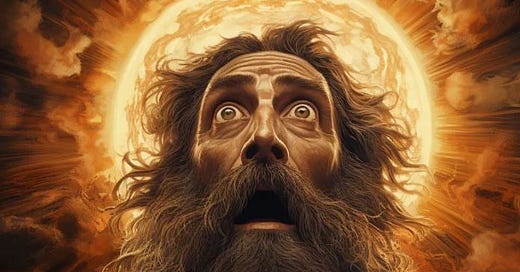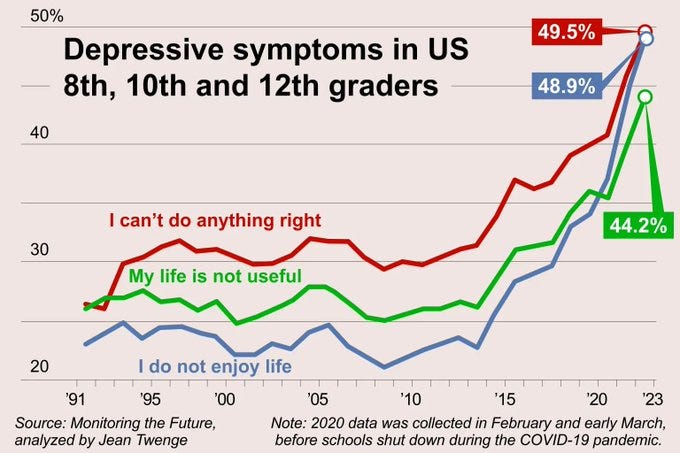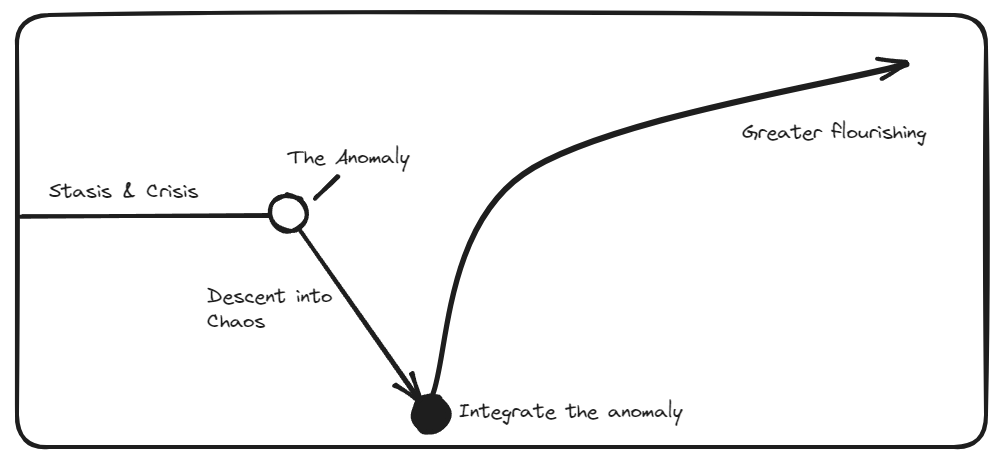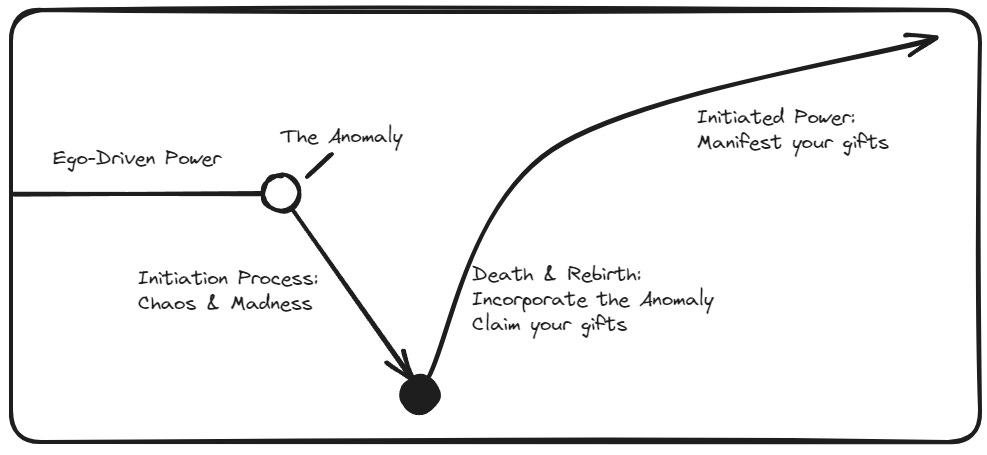[16 minute read/ 11 minute listen]
"With great power, comes great responsibility"
- Uncle Ben, Spider-Man
“Chesterton’s Fence” is a powerful concept that helps explain a lot of what’s happening in today’s world:
Don’t remove a fence until you know why it was put up in the first place.
Our modern society, with its deadly mix of arrogance and certainty, has dispensed with a vast number of controls that had kept us in harmony with the world for hundreds of thousands of years.
Many other cultures enshrined the concept of “initiated” knowledge and power. Mass access to technology and information has knocked down many of those fences. This has had phenomenal benefits, but also substantial costs. In the book Jurassic Park, Dr. Ian Malcolm gives a brilliant speech:
Most kinds of power require a substantial sacrifice by whoever wants the power. There is an apprenticeship, a discipline lasting many years. Whatever kind of power you want. President of the company. Black belt in karate. Spiritual guru. Whatever it is you seek, you have to put in the time, the practice, the effort. You must give up a lot to get it. It has to be very important to you. And once you have attained it, it’s your power. It can't be given away: it resides in you. It is literally the result of your discipline…
…Genetic power is the most awesome force the planet's ever seen but you wield it like a kid that's found his dad's gun...I'll tell you the problem with the scientific power that you're using here: it didn't require any discipline to attain it. You know, you read what others had done and you took the next step. You didn't earn the knowledge for yourselves so you don't take any responsibility for it. You stood on the shoulders of genuises to accomplish something as fast as you could and before you even knew what you had, you patented it, packaged it and slapped it on a plastic lunchbox and now you're selling it!
This makes Silicon Valley’s mantra of “move fast and break things” unintentionally hilarious. So much of what we’ve defined as innovation over the last few years has been handing toddlers TASERs. Neuroscientist
recently wrote a great piece which half-jokingly implies that the Mayans were right, and the world did in fact end in 2012. This is the year when smartphones became truly ubiquitous. Social media’s engagement models now appear to have unintentionally exacerbated a mental health crisis that is killing our children in horrifying numbers. They moved fast, and broke our kids.I am increasingly concerned that things are going to get much worse before they get better (and I do believe they’re going to get a lot better).
Anomaly and Insanity
Why should access to some kinds of knowledge be controlled? In the age of search engines it seems outdated and patriarchal.
One of my central preoccupations for the last few years has been “the anomaly.” This describes something relatively well proven by science, that we still haven’t incorporated into society. There are abundant signs that the current anomaly involves integrating the idea of a guiding intelligence beyond the human intellect. This can precipitate a dark night of the soul as our limited egos desperately cling on for dear life. As Galileo would testify, we’re typically uncomfortable finding out that the world doesn’t revolve around us.
The focus of my life’s work is on the benefits of openness and following your curiosity. But there is an important caveat. There may be such a thing as too much, too fast. When you encounter an anomaly this dramatic it tends to shatter your existing worldview. The resulting psychological chaos is often incredibly unpleasant.
One of the hallmarks of encountering the anomaly is synchronicity. These are meaningful coincidences. The problem is, as somebody warned me shortly after my own direct experience of the anomaly, it’s solely down to you to determine if the coincidences are meaningful, as they probably won’t sound significant to others. Even worse, the first time you encounter synchronicities as a reality, you risk seeing them everywhere. Psychosis is all too common, as is grandiosity. Moreover, if you’re too open without discernment you’ll believe anything. As psychedelics go mainstream we’re seeing an explosion in “conspirituality”, where people can’t determine which hidden patterns are real or imagined.
I have no view on the existence of Aliens or what UFOs are. But this year has been filled with signs that I need to maintain a much more open mind. My friend Michael Garfield recently shared an interesting article with me that I’ve been thinking about for months. It ponders if “the phenomenon” is here to control us or accelerate our development.
The phenomenon is a developmental driver because the entities seem to employ ontological shock in measured doses at every developmental level, creating a discord in the experiencer. The discord of ontological shock is when the experiencer’s current world view is insufficient to make sense of the anomalous experience they’ve had. The cognitive dissonance functions like an energy source. Sometimes it is destructive, many times it is transformative. Other times what begins as destructive slowly transmutes into transformation.
Too much “ontological shock” too fast can break your psyche. You don’t need to believe in aliens to hear resonance in that argument. There’s something mysterious about our interactions with the world that tries to make our development keep pace with our discernment. When the student is ready, the master appears. If there are more advanced entities sharing the world with us, you can see how they’d want to see us grow up a little more before they hand us their technology.
Aliens aside, powerful knowledge was deliberately withheld in ancient societies for the same reasons. You needed to be initiated first.
We’re taking a wrecking ball to that particular fence right now.
Icarus Inc.
“Beware unearned wisdom”
-Carl Jung
The last decade has seen an explosion in the usage of substances and practices that generate altered states. These can be enormously healing, but not without risk. The “ontological shock” needs to come while you’re inside a safe container. Another tragic fence removal is of physical spaces and communities people can go to integrate these overwhelming experiences safely, without being pathologised or unnecessarily sedated.
In our hubris, we have often stripped powerful plant medicines from the reverent context other cultures wisely kept them in. This is because we have also diminished the essential role of the shaman or prophet. They act as canaries in the coal mine for the anomaly. They integrate it into themselves first, at immense psychological cost, so they can then ease the transition of everyone else through that process. That initiated power “resides with them.” I am constantly stunned that all the people I believe to be prophets diagnose the anomaly in roughly the same terms.
As we open our minds, we need wise elders who can simultaneously help us refine our discernment. They are often unpopular precisely because they tell us when we need to slow down and shut up. Silence and patience are central to an initiation process.1 This the opposite of our current approach to technological arms races. I’ve read hundreds of corporate presentations and I’ve never encountered a slide that said “we are going to sit, watch and wait for five years to see if this technology is beneficial for society.” Corporate manchildren and spiritually adolescent “captains of industry” don’t like being told what to do. But our elders can teach us practical tools for wisdom and grounding.2
Between Mundanity and Insanity.
“If you ignore the sacred, the mundane will crush you. If you ignore the mundane, the sacred will burn you.”
-Jamie Wheal
By now you may have spotted a possibility that’s been troubling me a lot recently.
If my assessment is correct, as a culture we are somewhere around the stasis/crisis stage of the Hero’s Journey. The very next stage is the encounter with the anomaly. We might be sitting just to the left of the white dot below. It gets worse before it gets (much) better.
This suggests the possibility of an imminent society-wide descent into chaos and madness (the new Fourth Turning book seems to think so too3). Now, many people would argue we’re already there. Or that the slaughterhouse of the Twentieth Century means it’s behind us. I just don’t know. Either way, if the anomaly is coming, we’d all better be ready to build and to serve.
One of the best descriptions I’ve read of a visionary entrepreneur is “someone who sees something that needs to exist in the future, and builds it in the present.” In the case of rebuilding Chesterton’s fences, we can at least look to the past for clues.
Surveying the current landscape with my finance hat on, I see a concerning investment barbell. At one end you have an epidemic of demand for mental health resources for people stuck in mundanity. On the other you have a historically-unprecedented explosion of tens of millions of people tinkering with advanced psychotechnologies.
There is a middle way. Balanced between stagnant order and overwhelming chaos lies a place of stable transformation.
This is the safe space where we can develop our own “power that resides in us.” Initiated power. When you bring the anomaly into yourself you manifest your unique gifts. The initiation process also teaches us, often harshly, how to use them in service of our culture’s urgent transition. This positive-sum life lies on the other side of first disconnected boredom, then the suffering and uncertainty of the transitional stage. It’s what makes the journey worth it. It leaves us in a more integrated state of active flourishing that’s superior to the passive comforts of late-stage capitalism.
It’s increasingly looking like our zero-sum mentality can only be transcended through a crisis or the development of an outcome that’s truly better. An economy that facilitates meaningful personal transformation is how humanity evolves and survives.
We seem to be hurtling towards a turning point defined either by technologically-induced destruction or awakening into maturity. If that’s true, we should expect to see a spontaneous increase in conscious and unconscious demand for initiation processes. But this is all happening in a society that doesn’t have the relevant rites of passage. Indeed, it makes me wonder how much of today’s “mental illness” epidemic is due to people unconsciously repressing their intuitive gifts, or experiencing these initiatory crises without understanding why. We’re yearning for something we can’t even articulate or define, but that would offer us collective and individual salvation.
Demand for initiation into personal transformation is skyrocketing, but there’s no reliable supply of safe containers.
Many of the biggest fortunes of the last twenty years were made by moving fast and knocking down Chesterton’s fences. This blind use of uninitiated power has frequently been horribly destructive. I hope that many new fortunes will be made in responsibly rebuilding them. I wish I could say I thought this would be interesting to traditional venture capitalists or private equity. But I am increasingly meeting wealthy individuals and families that see the win-win of developing transformational resources they can also use for themselves and their children. This can mean creating safe spaces, promoting healthy altered states, amplifying the wise and rebuilding our institutions. This industry is evolving so rapidly that the risks and opportunities are still taking shape. I recently hosted a small event to help bring this community together and sketch out the landscape and opportunities.4 There will be more. I couldn’t be more optimistic about the growth prospects of this area.
As someone who has straddled finance and spirituality for years, this is the potential fulfillment of an ultimate goal: meaningful use of capital.
In ritual initiatory process, there is a moment of wonder and initiation and death and rebirth and union that the ancient Greeks called Telos. There is a place where wonder, initiation, death, ecstasy, transformation, and regeneration all meet. And if you take a mythic eye to the human being and to human history, then you understand that the vast majority of things that we do in one way or another, are aiming towards that moment. That sacred moment. The promise of that telos, the promise of that ecstatic moment, the initiatory moment, the death moment, the moment of the contact with the mystery, is the communion with the vastness. And that communion brings about the death of the small self. It blows us apart and shatters us. And at the same time it reconstructs us and initiates us into a place of greater alignment with what is. This is the door that the initiate walks through that opens them up to the power of the universe. And the question for human beings has always been how to construct cultural and ritual and initiatory containers that can handle and distribute access to this power. So the shaman sorcerer in traditional cultural context is held in a web of relationality and accountability and they get there through slow, gradual, initiatory steps. And those steps are walking that path of initiation. This is what human beings ultimately long for.
-Joshua Shrei
Related Reading and Listening.
Listen. So You Want to Be a Sorcerer in the Age of Mythic Powers... (The AI Episode) by Joshua Schrei at The Emerald (1 hour 57 minute listen)
Why listen. That passage above comes from a spookily-timed recommendation from Michael Garfield. This podcast is specifically about the historical concept of initiated power and exponential technology. It was recommended to me after this piece was written. I particularly enjoyed from 54 minutes onwards. I have also written about the urgent need for a wisdom school in the age of A.I., also making the slightly obvious link to the The Sorcerer’s Apprentice.
Read. The Infinite Game O.S. by Erick Godsey (20 minute read or a 45 minute podcast in Erick’s pleasingly deep voice).
Why read. A great recommendation from my friend Nader. This article was one of the first I’ve read that finally helped me understand David Deutsch’s much-lauded book The Beginning of Infinity. He also talks about the importance of staying grounded in the world.
Good explanations bring us into radical intimacy with God, and the gift of this intimacy is that God gives us alchemy.
Before we go further, it is important to note, there is a bug in the Infinite Game OS that many people run into and their computers glitch. A glitched computer is psychosis. A glitch can lead to a crash, and a crash is a psychotic break… With the help of the euphoria of realizing the ecstasy of an infinite universe, the ego starts weaving the story it most wants to be true, with complete disregard for reality….The glitch is the finite ego tripping over infinity.”
Listen. Synchronicity: your mind is entangled with the world, the Justin Riddle podcast (39 minute listen).
Why listen. Another (!) recommendation from my kind friend Nader. I haven’t gotten close to figuring it out yet, but there’s a lot in Riddle’s “three world model” that resonates with Ervin Lazlo’s theory of the Akashic Field.
In the three-world model, we often think about the human mind as tapping into the platonic domain through thinking, through knowledge, through academics and reading and having conversations with other people. But there's also this direct line, at least in the Penrose model, between the platonic world forcing itself into the physical world and would that appear more so as this sort of connection between our thoughts being connected up with the physical world around us?
I've unfortunately had friends or acquaintances that have gone into psychotic episodes. You see this tendency to hyper-attribute meaning to things that are not meaningful, to things that really are just coincidences or really don't have have a deeper meaning there. So Carl Jung, even within his profession of seeing all these patients with schizophrenia, in his day job, he still believed in synchronicity and still believed that it was something deeper and meaningful about reality.
Listen. Talking Billions: William Green: Richer, Wiser, Happier: From Investing to Kindness, Spirituality, Pursuit of Freedom and More (1 hour 37 minute listen)
Why listen. This conversation is between two of the most delightful voices in finance (both literally and figuratively). William has that priceless mix of investing insight and spiritual depth. He’s interviewed so many of the world’s best investors, but also has the penetrating discernment to see what truly mattered to them in the end.
William: “When you see someone who's as brilliant as Ed Thorpe, Saying to you, it all comes down to relationships in the end. That's very valuable. And I think we often try to clone the wrong things from investors. We'll look at the great investors and we'll say, “well I should figure out how to get super rich so I can have beautiful home and a car and a plane and stuff like that.”
And it's like, yeah, that's, that's fine as far as it goes. But actually, I increasingly think what you want to learn from them is the much more personal stuff. Like how do you build a really rich life, a truly rich life? What part do relationships play in that? How do you have good relationships? What actually makes for a good relationship for a good partnership?
The information provided is for educational and informational purposes only and does not constitute investment advice and it should not be relied on as such. It should not be considered a solicitation to buy or an offer to sell a security. It does not take into account any investor’s particular investment objectives, strategies, tax status or investment horizon. You should consult your attorney or tax advisor.
The views expressed in this commentary are subject to change based on market and other conditions. These documents may contain certain statements that may be deemed forward looking statements. Please note that any such statements are not guarantees of any future performance and actual results or developments may differ materially from those projected. Any projections, market outlooks, or estimates are based upon certain assumptions and should not be construed as indicative of actual events that will occur.
After my own awakening experience, a mentor advised me not to write or talk about it for at least four years. I lasted about twelve hours before blabbing to everyone I knew. Only six years later am I finally able to place it into a fuller context.
John Vervaeke stands out as a member of the “new worldview” community because of his ecology of practices. This is a mix of embodied, contemplative and meditative practices that dynamically balance each other out. His are specifically Vipassana, Metta (loving kindness meditation) and Tai Chi.
I strongly recommendN.S. Lyonsreview of Neil Howe’s new book “The Fourth Turning Is Here”
Let me know if you’d like to be involved in future events. These discussions are Chatham House rules, but happy to share my own thoughts on the landscape with anyone who’s interested.








Incredible article! I’ve read a number of your previous posts (I began following your page two-ish months ago) and this one seems to integrate/synthesize everything you’ve been writing about the most seamlessly. Or maybe it just speaks to me that way based on where I’m at in my own journey... Either way, great piece of writing!
I must say, though, as much as I find your diagnosis of the problem to be spot on (i.e. this collective state of spiritual immaturity combined with immense technological power) I do worry that your optimism is too, well, optimistic. I tend to think -- not exclusively, but predominantly -- that the opportunities of the coming decades (if the human experiment indeed survives that long) will mainly reside at the individual level. In other words, I’m very doubtful we’ll be able to bring about this sort of *society-wide* rebirth of wisdom, spiritual integration, etc etc, and think that on the whole it will be a minority of individuals who decide to pursue this path and live as wisely and consciously as they can within the larger context of an increasingly insane, alienated, unwise society. To me, the forces (technological, economic, etc) driving this societal path have taken on something of a life of their own, and humans no longer have as much autonomy/control as we used to/as we like to think we still do. Techno-capital has its own telos, as it were. It will not be an enlightened humanity that rises up from the dark night of the anomaly, but a new kind of being, one driven by a synthetic intelligence far beyond the capacity of our monkey minds.
I may have lost you there -- no worries. It may boil down to the difference in worldview between a “capitalist” like yourself and a ... someone more intellectually influenced by critical theory/“anticapitalist” thinkers?
Either way, and to wrap this whole thing up (I did not anticipate writing such a long comment), I do respect your optimistic take. Don’t get me wrong there. Indeed, you may end up being right -- I’m pretty open minded about where this whole “situation” is going -- and, if you are right, I think you’re very correct that this beautiful future for humanity will hinge to a large degree on a rebirth of responsible “psycho technology” (love that term!) usage. I’m glad there are people like you who understand this and are working towards bringing it about, and honestly, I hope to join you in that effort one day. Thanks again!
Tom, your emphasis on that v-curve and its variations, have been useful metaphors. Therapeutic in fact. I want you to know that.
On descending into chaos, the biggest mistake is to try crawling back up the cliff we fell from. To restore that old sense of comfort. Individuals and even countries can get lost in these restoration projects. We ‘refuse the call’, because we want to believe there must be some shortcut to get back up. Some quick hack that fixes everything. Ironically, we end up spending tremendous time & energy in looking for these shortcuts. Decades can fly by. All the while our present situation keeps getting worse and worse. It’s waiting for us to understand and embrace it.
Nostalgia may be useful in our evolution, but it is also a tremendous burden. There is a lot of freedom in realizing that we must ‘burn the boats’ and embrace the suffering. We can get back to the river, but never to the same river. We can go back physically, but there is no going back mentally.
Perhaps you have written on this, and I have missed it. Would appreciate your thoughts on this.